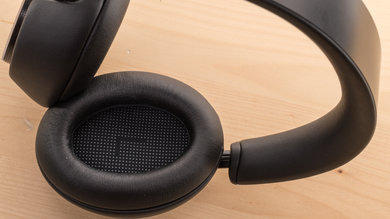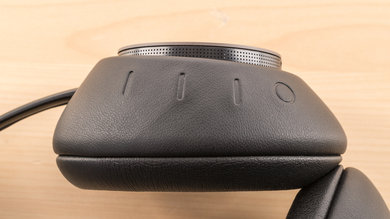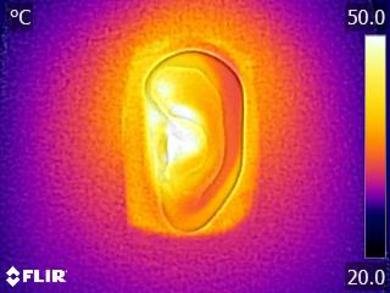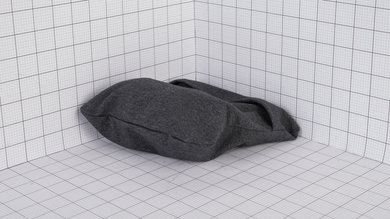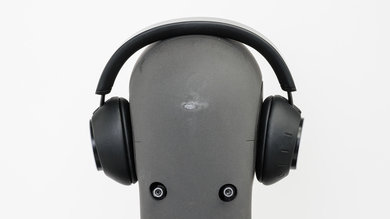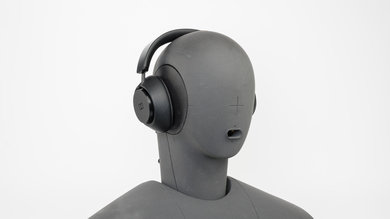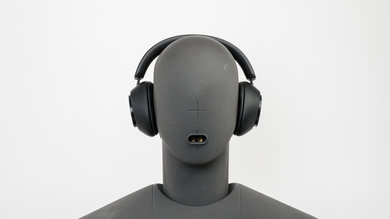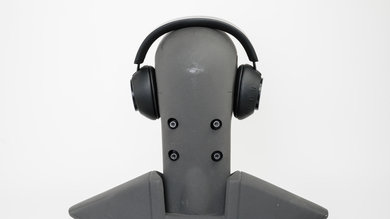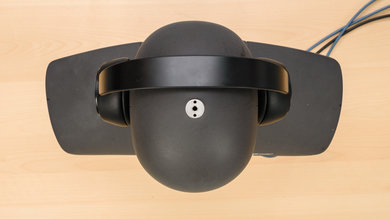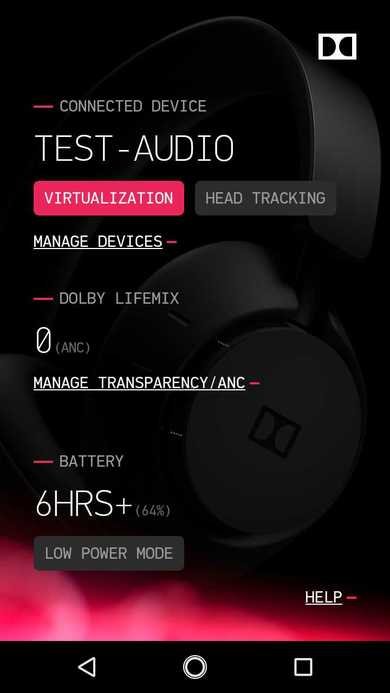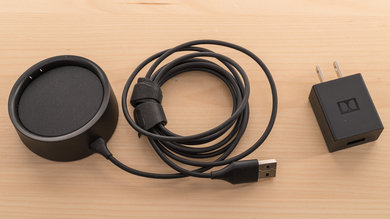The Dolby Dimension are decent, mixed-usage, over-ear headphones that are fairly versatile for everyday casual use and can also be used for watching TV if you have the appropriate low-latency (aptX-LL) dongle. These headphones are comfortable to wear for hours and feel very solid. They look and feel premium, but their ANC feature is disappointing when compared to similar high-end headphones. They have nice virtualization and head tracking features, but if you don’t care for this, they might not be worth the investment.
Our Verdict
The Dolby Dimension are okay for mixed usage. These headphones have okay audio reproduction for critical listeners but have nice virtualization and head tracking features that may enhance your listening experience, especially when watching video content. They have decent isolation performance to use while commuting or at the office. On the other hand, their bulky and full leather-covered design won’t be ideal for sports and is not sweat-resistant. Also, they have average Bluetooth latency, so they might not be the best option for watching videos or gaming unless you get an aptX-LL dongle, which still doesn’t give great results.
-
Great build quality.
-
Comfortable wireless design.
-
Virtualization and head tracking features.
-
Disappointing noise isolation.
-
Mediocre battery life.
-
Lackluster app with few customization options.
-
Bass delivery varies across users. Sensitive to glasses.
The Dolby Dimension are decent for neutral listening. They have a punchy bass and a well-balanced mid-range, but the treble range lacks detail and brightness. Their bass is also a bit inconsistent across users, and their mid-range is a bit cluttered and forward. They also don’t have an EQ inside their app, which is disappointing, and their passive soundstage is perceived as small and closed-off.
The Dolby Dimension are decent for commuting. Their isolation performance is suitable for your daily commute. They don’t isolate low-frequency noises like bus engine rumbles very well, but when playing audio content it should be fine. You can also wear these during long flights or car rides thanks to their comfortable build and 9-hour battery life.
The Dolby Dimension are decent for sports. While they're fairly stable for over-ear headphones, they might be too bulky for physical activity. Their leather-covered build won’t be the most breathable and sweat might degrade the coating.
The Dolby Dimension are decent for the office. They isolate a good amount of ambient chatter and A/C noises, and they are comfortable to wear for a few hours. They can also connect to three devices simultaneously so you can easily switch between your PC, tablet, and phone. Their battery life will be long enough for a full workday and they don’t leak too much as long as you don't blast your music at very high volumes. However, you might have to charge them more frequently than other similar headphones.
The Dolby Dimension are poor for gaming. They have too much latency for gaming. Their microphone is sub-par and isn’t suitable for online games. However, if you’re playing casual solo player immersive games and have an aptX-LL dongle, these headphones could be an interesting option thanks to their virtualization and head tracking features, similar to the Audeze Mobius gaming headset.
- 6.9 Mixed Usage
- 6.6 Neutral Sound
- 7.4 Commute/Travel
- 7.2 Sports/Fitness
- 7.1 Office
- 5.6 Wireless Gaming
- 5.5 Wired Gaming
- 6.1 Phone Call
- Updated Nov 21, 2019: Converted to Test Bench 1.3.1.
- Updated Nov 21, 2019: Converted to Test Bench 1.3.
- Updated Sep 09, 2019: We've updated the Build Quality score of these headphones.
- Updated Mar 15, 2019: Review published.
- Updated Mar 13, 2019: Early access published.
- Updated Mar 12, 2019: Our testers have started testing this product.
- Updated Mar 11, 2019: The product has arrived in our lab, and our testers will start evaluating it soon.
- Updated Feb 27, 2019: We've purchased the product and are waiting for it to arrive in our lab.
Compared To Other Headphones

The Dolby Dimension are well-built and comfortable over-ear headphones that set themselves apart thanks to their virtualization and head tracking features. Unfortunately, their ANC isn’t on par with other high-end headphones we've tested, and they have relatively short battery life. If you’re looking for headphones for your commute, we suggest looking at our list of the best noise cancelling headphones recommendations. See also our recommendations for the best closed-back headphones.
If you’re in the market for head tracking headphones, then the Audeze Mobius are a better pick over the Dolby Dimension Wireless. The Audeze's frequency response is slightly bass-heavy but still suitable enough for a variety of audio genres. They're also very versatile since you can use them wired, and their detachable boom microphone is great for gaming. However, the Audeze don’t have an ANC feature to block ambient noise like the Dolby and aren’t as comfortable and well-built.
The Microsoft Surface Wireless Headphones and Dolby Dimension Wireless perform quite similarly in most categories. The Microsoft have an excellent control scheme and their ANC feature can reduce more ambient noise around you, which make them a better option for commuting. On the other hand, the Dolby have head tracking and virtualization features to enhance your listening experience but don’t have an EQ like the Microsoft have. The Surface Headphones also have a great wireless range and can also be used wired, even if the battery is dead.
The Sony WH-1000XM3 Wireless are more versatile headphones than the Dolby Dimension Wireless. The Sony isolation performance is noticeably better, and they have a better audio reproduction, on top of having customization options inside their great app. They're slightly less comfortable and well-built than the Dolby, but most people should be satisfied with the Sony. They can also be used wired, even if the battery is dead, which you can’t do with the Dolby. On the other hand, the Dolby support aptX-LL for watching video content.
For watching TV at home, the Sennheiser RS 185 RF Wireless are a better option than the Dolby Dimension Wireless if you don’t want to purchase an aptX-LL dongle. Their dock acts as a transmitter, which gives you lower latency for watching video content. However, they're open-back and won’t isolate against your household noise, which the Dolby Dimension Wireless ANC feature can help with. The Sennheisers have great audio reproduction, but you’ll need batteries to power them and they aren’t as well-built and comfortable as the Dolby.
Test Results
The Dolby Dimension are sleek-looking headphones. They are mostly made out of metal and covered in leather, which gives them a high-end look. The backing of the ear cups is flat and acts as a touch-sensitive surface with the Dolby logo. The padding on the cups isn’t that thick, but the leather covering the cups makes it look like it is. The headband is well-padded, and a thin sheet of metal covers it, finishing the whole design with a premium look.
The Dolby Dimension are very comfortable headphones that you can wear for hours without feeling any soreness. They are on par with the Bose QuietComfort 35 II/QC35 II Wireless 2018 and feel very lightweight once on the head. The cups are well-padded, large enough to fit most ears without them touching the drivers. The headband has great padding as well and helps distribute the weight evenly on your head, without applying too much pressure.
These headphones have a touch-sensitive control scheme on their right ear cup. It's one of the most responsive and accurate touch-sensitive surfaces we’ve used. You can easily swipe up and down to control the volume and swipe left and right to skip tracks. A single tap plays/pauses your music and lets you answer calls as well. You can also double-tap the surface to enable transparency mode, which is basically talk-through and triggers your device’s voice assistant. Unfortunately, you don’t have any control over the ANC level. On the upside, you also have access to three physical buttons that can each be mapped to three different devices to easily switch between sources. Note that, like the Sony WH-1000XM3 Wireless, their touch-sensitive control scheme is hard to operate in cold and freezing conditions.
Like most over-ear headphones, the Dolby Dimension trap heat under the ear cups and aren’t very breathable. Their design creates a decent seal around your ears and doesn’t allow much airflow, and you might notice a temperature difference. This means you'll most likely sweat more than usual if you work out with them.
Over-ear headphones are usually not very portable, and the Dolby Dimension are no exception. They don’t fold into a more compact format and the cups don’t swivel to lay flat and wear around your neck. They also don’t come with a hard case to protect them when you’re on the move, which is disappointing at their price point.
The Dolby Dimension are very well-built. The materials used feel high-end and heavy, giving a premium feel to the headphones. They feel very sturdy when in your hands, yet lightweight when you put them on. Most of the build is made out of metal, and the cups are covered with leather, which gives them a high-end finish. However, they feel so heavy that an accidental drop on the ground could be damaging. Over time, the thin metal sheet on the top of the headband also unglued itself from our unit, which is a little disappointing.
These over-ears are quite stable. They aren’t too tight on the head, but the fit is stable and secure. You could wear them while jogging or at the gym without too many issues. However, more intense physical activities or lots of head movement will make them sway around and they could come off your head, especially when tilting forward or backward. On the upside, since they are wireless, you won’t have to worry about a cable being in your way, or accidentally yanking the headphones off if it were to get hooked on something.
The Dolby Dimension have a mediocre frequency response consistency performance. They're prone to consistency issues throughout the range, especially in the bass range. The maximum variance measured across our five human subjects was about 8dB at 20Hz, which is noticeable. We also noticed that certain types of glasses could break the seal on these headphones and cause a bass drop. In the treble range, the maximum amount of deviation below 10kHz is about 6dB, indicating that their treble delivery is rather sensitive to positioning.
The Dolby Dimension have very good bass. The LFE (low-frequency extension) of 25Hz is great. Low-bass is underemphasized by almost 2dB, which means these headphones slightly lack thump and rumble, so their bass may not be heavy enough for fans of bass-heavy genres like EDM, hip-hop, and dubstep. Mid-bass, responsible for the body of bass guitars and the punch of kick drums, is within 1dB of our curve, which is good. High-bass, responsible for warmth, is overemphasized by about 3dB, which will add a bit of boominess to the sound.
The Dolby Dimension's mid accuracy is great. The response throughout the range is slightly overemphasized, but it is flat and well-balanced. The 3dB of overemphasis in low-mid is the continuation of the high-bass, meaning vocals and lead instruments will sound cluttered and thick. Also, mid-mid is over our target curve by about 2dB, which will slightly nudge the vocals forward in the mix. They might sound a bit too “mid-rangy” for some, especially if you have virtualization enabled.
The Dolby Dimension's treble is mediocre. The range is fairly flat, but there is a broad and deep dip between 4kHz and 8kHz, which negatively affects the brightness and detail of sibilants (S and T sounds). This will be most noticeable on vocals, lead instruments, and cymbals.
The imaging is okay. Unfortunately, they show audible amounts of group delay in the bass range which results in a slightly soft and loose bass, but this might not be audible for everybody. On the upside, the L/R drivers of our test unit were well-matched in amplitude, frequency, and phase response, which is important for the accurate placement and localization of objects (voices, instruments, video game effects) in the stereo image. However, these results are only valid for our unit, and yours may perform differently.
The soundstage is poor. The PRTF graph shows a limited amount of pinna interaction and activation, and there is no 10kHz notch present either. Since creating a speaker-like soundstage is dependent on an accurate and adequate pinna interaction, their soundstage will be perceived as relatively small and located inside the listener's head, as opposed to in front, and will be less open-sounding than open-back headphones.
Like the Audeze Mobius, we measured the Dolby Dimension's soundstage without their virtualization feature. However, we don't measure the DSP-aided soundstage. That said, we perceived their soundstage to be noticeably better with virtualization ON.
The Dolby Dimension have passable noise isolation that isn't as good as competing models like the Sony WH-1000XM3, the Bose QuietComfort 35 II/QC35 II Wireless 2018, or the Microsoft Surface Wireless Headphones. The active noise cancellation achieves 10dB of isolation in the bass range, which means they're okay at cancelling out airplane and bus engine rumbles. However, they achieve 16dB and 38dB of isolation in the mid and treble ranges respectively, both values being quite good. This indicates good isolation performance for speech and sharp sounds like S and Ts and fan noises like A/C systems.
Note that we had difficulty getting a tight seal on our dummy head, so we had to use elastic bands to hold them. This amount of isolation is pretty close to what we measured on human subjects, but some people may experience an even better isolation performance.
The leakage performance is decent. A significant portion of the leakage is between 500Hz and 5kHz, which is a relatively broad range and mostly concentrated in the treble range. This means that the leakage will sound quite thin. The overall level of the leakage is not loud either. With the music at 100dB SPL, the leakage at 1 foot away, averages at 38dB SPL and peaks at 50dB SPL, which is the same as the noise floor of an average office.
The Dolby Dimension have a sub-par integrated microphone. In quiet environments, speech recorded or transmitted with this mic sounds noticeably thin, muffled, and lacking in detail. In noisy situations, this microphone can separate speech from background noise in moderately loud places, like a busy street, but it may struggle in louder places.
The Dolby Dimension's integrated mic has poor recording quality. The LFE of 232Hz results in recorded or transmitted speech that is noticeably thin. The HFE of 1.7kHz suggests speech that lacks a lot of detail and presence. This result is worse than most Bluetooth headphones and will make speech recorded sound even more muffled.
The integrated microphone has okay noise handling. In our SpNR test, it achieved a speech-to-noise ratio of about 19dB, indicating it's best suited for quiet and moderately loud environments. However, it will struggle to separate speech from ambient noise in loud situations.
The Dolby Dimension provide 9 hours of continuous playback with virtualization on and about 10 hours without it, which is lower than the advertised 16 hours. We tested the battery life without virtualization twice and got the same result of 10 hours despite 16Hrs being shown in the app. When compared to other high-end ANC headphones, this result is lower than expected and slightly disappointing. This should still be enough for a full workday, but you’ll have to charge them daily, especially if you want to use them while commuting as well. You can enter a standby mode by pressing the power button once or hold for 4 seconds to completely power off. Unfortunately, they don’t have a jack to plug in an audio cable to use while wired so you can't use them passively like the Bose QuietComfort 35 II/QC35 II Wireless 2018 or the Sony WH-1000XM3 Wireless when the battery dies. However, you can enable a Low Power Mode to turn off all active features and LifeMix to slightly extend their battery life.
The Dolby Dimension mobile app is a very nice looking and sleek app, but it lacks features and is slightly disappointing. You have control over the virtualization and head tracking features, and you can also control the amount of ANC and talk-through. You get battery life information, and you can also map the 3 physical buttons on the right ear cup to previously synced devices. Unfortunately, this app is lacking an EQ. You can’t customize their sound to your liking, but you can completely turn off ANC by enabling Low Power Mode.
These are the first headphones we’ve tested that can connect to three devices simultaneously. You can easily switch between the connected devices by using the physical buttons on the right ear cup. Unfortunately, the Dolby Dimension don’t support NFC for a quicker and easier pairing procedure. On the upside, they provide a clear voice prompt that lets you know which source you’re listening to.
If you don’t have an aptX-LL dongle, these wireless headphones have 225ms of latency, which is average for a Bluetooth pair. You might notice a delay when watching video content on your phone meaning that what you will see won’t be in sync with the sound, but some devices and apps offer some sort of compensation. We also measured 170ms with an aptX-LL dongle, which was surprisingly high. We measured 77ms delay with another dongle, which is lower, but still a bit high for this codec.
The Dolby Dimension come with a small circular USB charging cradle. The dock isn’t very portable, but you can still charge the headphones with a normal micro-USB cable, so you don’t have to carry it around. You can put the dock next to your TV for aesthetic purposes, but it isn’t mandatory to charge them. Also, the charging station doesn’t act as a proprietary wireless transmitter, which is disappointing.


